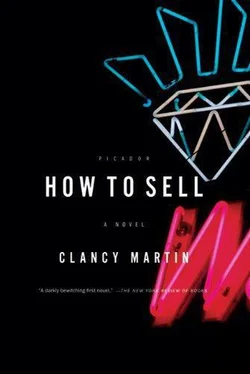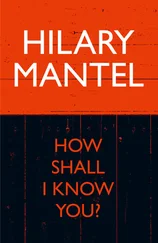“Well, Merry Christmas, everyone,” he said.
I thought perhaps I could feign fainting. Or faint for real, even.
“I have some bad news. Don’t want to keep you good folks waiting around on Christmas Eve any longer than necessary. I really hate to do what I’ve been given no choice but to do.” Run, Bobby. The doors are unlocked. Run! “Seems these fellas here”—and he waved his arm generally at the men around him, who moved in closer—“think we’ve — that is, I’ve — been up to some kind of wrongdoing. They aren’t too specific on the particulars, and you all don’t need to worry none. Don’t worry about any single little thing. Our lawyers will have this solved in no time, you can rest assured of that.” And he gave one of the men in particular a hard look. The man looked away at his shoes. “But they’re closing us down.” A wind went through the room. “And I’m afraid they won’t let me write you your Christmas checks. These boys won’t let me put a single damn dollar in your pockets for your families’ Christmases. And I know better than anyone how hard you’ve worked and how much you deserve it. I’m sorry. I’m truly sorry. And, for what it’s worth, Merry Christmas.”
He was tearing up. He smiled this strong smile.
“All right, fellas, let’s get this done.”
There was silence. Someone started to cry. Then a couple more joined in. Someone said, “Goodbye, Mr. Popper.” I expected a round of applause. They bundled him up and took him away. Three or four of the serious men in badly cut blue suits stayed behind to collect the store keys. They even collected case keys. The people who had safe combinations wrote them down. The men answered every question with a business card that had a lawyer’s phone number on it. They would not even respond to the questions of the rent-a-cops, who were important regular off-duty Fort Worth policemen.
Jim handed in his keys and we drove home.
“I wonder how long I’ll get to keep the Porsche,” he said as we stepped cautiously up the icy steps to his door.
T he day after Christmas I went back to Wendy and Calgary. Lisa had taken the money, that morning, but I had my stash in the closet, and the other five grand was waiting for me at the Royal Bank of Canada. I used it to buy Wendy a car, a preowned Fiat Spider convertible. I gave it to her for Valentine’s Day. That was my first car. Then, a year or so later, Jim called and asked me to join him in his new business. We called it Clark’s Precious Jewels.
W e were sitting in Jim’s office beneath the new Lalique crystal chandelier. “It will interfere with grading diamonds for color,” Jim had said while they were hanging it, “but I don’t give a damn. The thing is so expensive it will put people in the mood.”
“Speaking of money, how are we doing? Did you call Donnie today?” I asked him. Donnie was our principal Fort Worth banker. Not for our loans but for our operating accounts. The borrowing bankers were all in Dallas. We called Donnie every morning to find out our balances. “Did you make that deal with Alan?”
“He’ll be in before the weekend. You know Alan. He’s very reliable when it comes to business. Plus the bracelet is right here.” He shook a bulging job envelope on his desk. “He says he’s got a big party this weekend. He won’t show up without this bracelet on.”
It was an eighteen-karat yellow gold Rolex-style bracelet with round diamonds bezel-set on the small outside links, and baguette-cut diamonds bar-set all the way up the center link. The clasp was invisible so the diamonds went all the way around the wrist. An ugly thing, bulky, inelegant, but technically successful and sturdily made.
Jim would sell Alan and our other drug-dealer and celebrity clients crap like this because it was what they wanted and it was very profitable. I made the mistake of trying to sell them what I wanted to see them wearing. I still believed I could be proud of my customers. The ones I liked, I mean.
We were sorting a package of the tiny round diamonds called diamond melee at Jim’s desk. As he aged I noticed, more and more, how much Jim looked like our father. They carried their shoulders in the same way. Especially when he bent over the desk to inspect the diamond melee he might have been our father, viewed from behind, with a few extra pounds and with shorter hair.
“How did the sweeps come out?” I asked Jim. “Did you send Granddad his cut?”
“Great,” he said. “Yeah, I sent it to him. I had Sosa run it over. He said he seemed nervous. Probably should have brought it myself. I’ve got your envelope, too. It’s right here in my drawer.”
At the end of every month we gathered the gold sweeps from the benches and the casting area and sent it over to the smelters. Half of that cash went to me and Jim, and the other half went straight to Granddad, in the same courier package with the profit-and-loss statement and the ledger on his merchandise accounts. Initially our system had made Granddad anxious. Like most multimillionaires, over the years he had learned to avoid cash.
“What about the IRS?” Granddad had asked. “I can’t do a damn thing with this, Grandson. Can I deposit it in the bank?”
“Spend it! It’s pocket change for you. It’s the sweeps, Granddad,” we told him. For us these days he was like that rich duck who visits Huey, Dewey, and Louie.
“It’s untraceable income. You know how it works. We just sweep up the gold dust from the drilling off the floor. You sweep every night and this is what you have at the end of thirty days.” We did not mention the extras that never went to the smelter, or that we kept half of every sweep for ourselves.
“But you probably shouldn’t deposit it in a bank, no,” Jim had said. “A safety deposit box would be fine.”
“I don’t think you’re listening to me. I wasn’t asking. I was telling. This is a great system you’ve thought up, Grandson. We all go to jail together,” Granddad had said.
It was strange that Jim had not told me about the sweeps coming in.
“Glad you asked. I was about to tell you,” he said, and gave me a look. He pulled the envelope from his desk drawer and slid it over to me. “Forty-four hundred. Almost twice what we got last month. I love it when we are building this much custom. The extra cutting and polishing make all that much more gold dust. Even the platinum was up this month. If we knew what we were doing we’d start our own smelting company.”
That reassured me. He didn’t sound like he was making that up.
“Wendy will be happy,” I said. “Seems like that’s the only thing I can do these days to please her.”
He didn’t look up as he spoke.
“It’s just the baby. It’s called departum depression. When the baby departs the womb. She’ll come around. Concentrate on work, Bobby,” he said. “That’s what I do. Take one worry at a time. Focus on things you can fix. The other problems will solve themselves.”
“She wants me home more, she says. But as soon as I walk in the door she hands me the baby. I feel like all I do is work, and then I work more when I get home.”
“She won’t even drive up here to meet you for lunch,” Jim said. “I mean, I don’t want to say anything. But she should make an effort, too. It takes both of you. I hate to say it, but I told you not to marry a Canadian. They don’t understand the business environment. It’s foreign to them. They don’t understand what it takes to make it down here. Lily was no better than Wendy is, in that way. That’s why this time around I bought American-made in the wife department. Look at Wendy’s old man. He’s a professor, for chrissake. A Canadian college teacher. He probably drives a damn Volvo. I bet he was home every day by three o’clock. That’s what she’s comparing you with.”
Читать дальше











